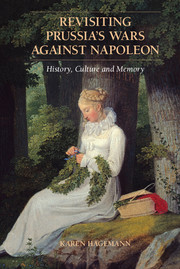Book contents
- Frontmatter
- Epigraph
- Contents
- List of Figures and Maps
- List of Abbreviations
- Acknowledgments
- Revisiting Prussia’s Wars against Napoleon
- Part One A History of Defeat, Crisis and Victory
- Part Two Discourses on the Nation, War and Gender
- Part Three Collective Practices of De/Mobilization and Commemoration
- Part Four Literary Market, History and War Memories
- Part Five Novels, Memory and Politics
- 15 Re-Creating the Past
- 16 Hopefulness and Disappointment
- 17 Critique, Desire and Glory
- Conclusion
- Epilogue Historicizing War and Memory, 2013–1813–1913
- Bibliography
- Name Index
- Subject Index
- Plate section
- References
17 - Critique, Desire and Glory
Novels of the Nachmärz and the German Empire
Published online by Cambridge University Press: 05 March 2015
- Frontmatter
- Epigraph
- Contents
- List of Figures and Maps
- List of Abbreviations
- Acknowledgments
- Revisiting Prussia’s Wars against Napoleon
- Part One A History of Defeat, Crisis and Victory
- Part Two Discourses on the Nation, War and Gender
- Part Three Collective Practices of De/Mobilization and Commemoration
- Part Four Literary Market, History and War Memories
- Part Five Novels, Memory and Politics
- 15 Re-Creating the Past
- 16 Hopefulness and Disappointment
- 17 Critique, Desire and Glory
- Conclusion
- Epilogue Historicizing War and Memory, 2013–1813–1913
- Bibliography
- Name Index
- Subject Index
- Plate section
- References
Summary
The failure of the Revolution of 1848–49 was a watershed moment not only for politics and society, but also for literary production. The second half of the nineteenth century became the golden age of “literary realism” in Germany. The literary historian Julian Schmidt and his colleague, the writer Gustav Freytag, were instrumental in developing the program for this movement in their joint literary and cultural journal Die Grenzboten. According to them, authors should only describe “reality,” all the while “awakening and nourishing a sense of the beautiful and the sublime.” As they saw it, “Poetic realism will lead to pleasing works of art when it also seeks out the positive side of reality, when it is combined with the joy of life.” They rejected the socially critical novels of Young Germany and the Vormärz as ugly and unpoetic, along with the mysticism of Romantic literature or the “cookie cutter writers” of historical fiction. They expected historical novels written in the spirit of literary realism to treat the author’s own national history:
The present must cast its light onto the past, so that the past appears to us as the present; not so that we recognize our present sentiments and reflections in it, but rather so that we understand the inner connection between the apparently alien point of view and our present one.
In order to offer “a picture [of history] that is vivid and comprehensible down to the slightest detail,” the author of a historical novel will however “need to accommodate to the conditions of history: he will base his picture on provincial history.” At the same time, the novel must be set during a period of this regional history “to which general historical interest is attached.” Only in this way can a provincial novel become a national one that appeals to an audience beyond a single region and attains national and international recognition. This ideal notion of realism within literary theory was faced with a practice in which the term increasingly evolved into a “catchword, a term of approbation” for the combination of literature with history and politics. Particularly since the beginning of the “New Era” in the 1860s, “realism” was used more generally to refer to a national-liberal program of literature and politics that focused on building the nation under kleindeutsch Prussian auspices.
- Type
- Chapter
- Information
- Revisiting Prussia's Wars against NapoleonHistory, Culture, and Memory, pp. 367 - 394Publisher: Cambridge University PressPrint publication year: 2015

